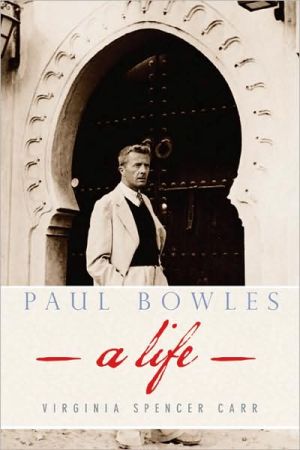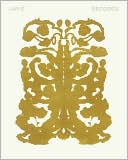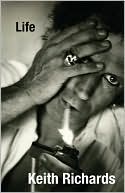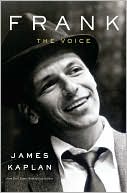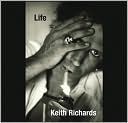Paul Bowles: A Life
Paul Bowles, best known for his classic 1949 novel, The Sheltering Sky, is one of the most compelling yet elusive figures of twentieth-century American counterculture. In this definitive biography, Virginia Spencer Carr has captured Bowles in his many guises: gifted composer, expatriate novelist, and gay icon, to name only a few.\ \ Born in New York in 1910, Bowles' brilliance was evident from early childhood. His first artistic interest was music, which he studied with the composer...
Search in google:
Paul Bowles, best known for his classic 1949 novel, The Sheltering Sky, is one of the most compelling yet elusive figures of twentieth-century American counterculture. In this definitive biography, Virginia Spencer Carr has captured Bowles in his many guises: gifted composer, expatriate novelist, and gay icon, to name only a few. Born in New York in 1910, Bowles' brilliance was evident from early childhood. His first artistic interest was music, which he studied with the composer Aaron Copland. Bowles wrote scores for films and countless plays, including pieces by Tennessee Williams and Orson Welles. Over the course of his life, his intellectual pursuits led him around the world. He cultivated a circle of artistic friends that included Gertrude Stein, W.H. Auden, Gore Vidal, Truman Capote, Allen Ginsburg, William Burroughs, Stephen Spender, and Carson McCullers. Just as fascinating for his flamboyant personality as for his literary success, Bowles' leftist politics and experimentation with drugs make him an ever-controversial character. Carr delves into Bowles' unconventional marriage to Jane Auer and his self-exile in Morocco. Close friends with him before his death in 1999, Carr's first-hand knowledge of Bowles is undeniable. This book encompasses her personal experiences plus ten years of research and interviews with some two hundred of Bowles' acquaintances. Virginia Spencer Carr has written a riveting biography that tells not only the story of Paul Bowles' literary genius, but also of a crucial period of redefinition in American culture. Carr is simultaneously entertaining and precise, delivering a wealth of information on one of the mostmythologized figures of mid-century literature. Kirkus Reviews Blinkered by the friendship she developed with her subject over the last ten years of his life, academic biographer Carr (Dos Passos, 1984, etc.) presents a one-sided and less than reliable account of America's supreme decadent genius. Her narrative runs through Bowles's long life (1910-99) at breakneck speed, virtually ignoring the 26 years after wife Jane's death. Born in Queens, only child of a rather unserious mother and an authoritarian father he abhorred, Bowles was single-minded and almost cold-blooded about his life's pursuit: to leave home and travel, meet as many people as he could to help him along, and become a poet and musician. He had startling early success: his poems were published in transition while still in high school; he obtained an introduction to study with Aaron Copland, who became his patron and perhaps the love of his life; and he developed important friendships with Gertrude Stein, Virgil Thomson, Orson Welles, Tennessee Williams, and numerous influential others. Supporting himself by writing incidental compositions for the theater, Bowles traveled to Morocco largely for the cheap availability of homosexual sex and hashish. In 1937 he met sheltered virgin Jane Auer, who "considered him a threat to her lesbianism" but married him to placate her mother. The couple lived and worked often in harmonious separation until her 1973 death from drug and alcohol abuse. Carr deeply mines Bowles's childhood and early years as a spokesman for non-Western music; her account of his initial success as a novelist (The Sheltering Sky, inspired by Jane's writing) moves blithely and is chock-full of encounters with famous musicians and belletrists. But she has enmeshed herself soexclusively in her subject that she fails to offer a sense of the compelling currents of the day-modernism, surrealism, existentialism, all important to Bowles-except as dates and names. Consequently, this is useful only to those who already have a working knowledge of his life. Nonanalytical and nonjudgmental, very much the way Bowles would have wanted it. Agents: Georges and Anne Borchardt
Paul Bowles\ A Life \ \ By Virginia Spencer Carr \ Scribner\ Copyright © 2004 Virginia Spencer Carr\ All right reserved.\ ISBN: 0-684-19657-3 \ \ \ Chapter One\ The Early Childhood of Paul Bowles (1910-1918) \ "At birth I was an exceptionally ugly infant. I think my ugliness caused the dislike which my father immediately formed for me." - -Paul Bowles to Bruce Morrissette, Jamaica, New York, January 14, 1930\ Paul Bowles hated his father. There was never a time that he could remember not hating him. When Bowles was six, his grandmother Henrietta Winnewisser told him that his father had tried to kill him when he was an infant. Henrietta could not abide her son-in-law and hoped that he would simply disappear before the child was irreparably injured. Bowles never doubted for a moment that his grandmother spoke the truth.\ Claude Dietz Bowles, Paul Bowles's father, was a dentist who spent far more time with his patients than he did with his family, whom he sometimes found asleep when he climbed the steep steps of the old brownstone at 317 Fulton Street in Jamaica, New York, where he lived with his bride of fourteen months and a son whose presence he resented. If Claude did not appear promptly at 6:00 P.M. for dinner - when he insisted that it be ready and on the table - his wife, Rena, ate alone, then left the dining room to breast-feed her infant in the nursery. On such nights Claude found his dinner in the oven, and he picked at it grudgingly as though he resented each bite. Claude saw his interloping son as the real culprit. A fresh-air enthusiast, he hated finding the infant swaddled in blankets in a stuffy nursery. One evening when his son was scarcely three weeks old, Claude stripped him naked and placed him in a wicker basket beneath the window, which he threw open to its full height. Had Henrietta not been awakened by her grandson's persistent cries and discovered him lying under a dusting of snow, she was certain he would not have survived the night. To Claude she had overstayed her welcome, and he was impatient for her to leave. He even offered to hire a maid, temporarily, to help with the chores, but his wife would not hear of it and insisted that her mother could stay as long as she wished.\ Paul Frederick Bowles was not a pretty sight upon his breach birth on December 30, 1910. An ugly gash creased the side of his head, and on both temples a doctor's forceps had left deep imprints. His mother's two sisters noted that their nephew's brow and crown were stretched grotesquely out of shape, but said nothing for fear of offending Rena herself. As a child, upon poring over early photographs, Bowles concluded that he resembled the pinheads at whom people gawked and snickered in the circus midway to which his mother's two brothers had taken him. He, too, had gawked at his baby pictures and demanded an explanation. Rena admitted that for a time she had concealed his misshapen head under flounced bonnets, but onlookers were quick to assume that something terrible had occurred in the birth process. "The scar over my eye today is a reminiscence of those natal difficulties," said Bowles, whose father begrudged the precious time he had taken from his dental practice to accompany his wife to the hospital. Scarcely an hour after their son's birth, two nuns marched ceremoniously to her bedside and wrenched the infant from her arms.\ "Your baby must be baptized into the Roman faith at once," the nuns whispered ominously. Rena threatened to scream and thwarted their mission. She and her husband were atheists, and the state of their son's soul was a moot point should he fail to survive the night.\ Rena's parents had traveled by train from their home in Bellows Falls, Vermont, to see their newborn grandson, and Henrietta stayed on for several weeks to help with the chores. She could tell that Claude was inordinately jealous of the baby and warned her daughter that his ill will would mount if she were not vigilant. When Rena announced that she wanted to name their son after her brothers, Frederick and Paul, Claude did not object. Any name suited him so long as the child was not a junior.\ Despite his inauspicious appearance as an infant, Bowles developed into a handsome boy with full lips, a well-shaped nose, a hint of a dimple in each cheek, a broad high forehead, blue eyes, and a crop of reddish-blonde curls that his mother refused to cut until he entered first grade. Bowles was twenty months old when Rena sent his picture to her sister Emma. "Paul has changed some since you saw him, hasn't he?" she wrote on the back of the snapshot.\ Even Claude was startled when at the age of two his son was reading aloud from cereal boxes and the labels on various household objects. Some of Bowles's earliest recollections were of a circle of adults around him while he answered orthographical questions. Claude, already displaying his lifelong skepticism of his son's talents, concluded that his wife had tutored him so that he would appear far brighter than he was. At three, Bowles wrote his first short story, an animal tale of two pages. "I wrote many short stories at that age, all of them about animals. I wrote every day, but seldom showed them to anyone, even my mother. Sometimes I read them to my Aunt Emma when she stayed with us, and she seemed impressed."\ Among Bowles's fondest memories as a child was the half hour he was allowed to spend with his mother after dinner in the privacy of his bedroom. "Here I could count on having her all to myself. I could carry on a conversation with my mother, who treated me as an adult. When I was very young, she called me 'Honeybunch.' I could sit on her lap and put my arms around her and hug her, but such behavior was strictly forbidden by my father once he witnessed it. I hated him for coming between us and spent much time thinking how I might retaliate."\ Bowles was four when his mother read to him the stories of Edgar Allan Poe, which both terrified and intrigued him. "Looking back now, I am sure I would have discovered Poe eventually on my own, for we had five volumes of his books in that sad little first apartment. I was six when I read, from cover to cover, every Poe volume in the house, and before the year was out I read them all again." Yet nothing by Poe was more horrifying to Bowles than his mother's account of her brothers' noses being smashed with a hammer by their father. She said that her grandfather's nose had also been smashed, as were the noses of his brothers, a tale her father confirmed. "I was astonished when he told me that if the blow were performed well, there would be no permanent discoloration. Although I thoroughly disliked my father, I was relieved that I was not a Winnewisser. My nose was bad enough as it was," he concluded.\ Bowles's mother told him that she herself had devoted many hours to the improvement of his nose by gently squeezing and pressing the tender cartilage at its bridge. "Young bones and cartilage were malleable, she told me, and you had to be very careful what shape they took. I wondered privately if I were slated to be the next victim of the hammer," said Bowles, who made no connection at first between his mother's massaging of his nose and a conversation he overheard regarding a cousin's allegation that the family was Jewish. Both before and during World War I, Marjorie Winnewisser spent several years in Berlin studying voice and performing in opera, and after the war she returned home to announce her engagement to an officer in the Royal Dutch Naval Reserve. "Why didn't you tell me we were Jewish?" she demanded upon confronting her father. She told him that in Germany the name Winnewisser was originally spelled Vennevitz, and that her friends in Berlin feared for her safety. The name is "definitely Jewish," they insisted and urged her to go home before she was persecuted.\ "Tell me the truth, Mother, are we Jewish?" asked Bowles.\ Rena replied that if it were so, she had no knowledge of it. "Your great-grandfather was a firebrand when he came to this country. He didn't think much of religion and wanted nothing to do with it." Bowles concluded that his mother was skirting the question. A few months later he observed her looking at a photograph of herself in profile and heard her exclaim with obvious disdain: "'Jewy, Jewy, Jewy!' I am sure my mother thought she looked Jewish, but I had no idea what characterized 'a Jewish look,' and still don't," he added.\ Composer Leonard Bernstein, who knew Bowles well over the years, whispered upon meeting his mother: "Oh, Paul, she's such a nice Jewish lady, and so very pretty." Bowles was taken aback by his friend's glib assumption and assured Bernstein that his mother was by no means Jewish.\ "Get off it! Are you pretending, don't you know she is or what?" Bernstein retorted.\ Bowles never knew for certain if the Winnewissers actually were Jewish, but declared that if they were, it would serve his father right since he was "rigidly anti-Semitic" and never got over his marrying Jane Stajer Auer, a Jew.\ Bowles's great-grandparents Frederick George Winnewisser and Caroline Christiana Landshultz left Germany in 1848, as did thousands of other emigrants of all ethnicities and national origins. Whether Frederick and Caroline knew each other before leaving their homeland is unclear, but both families came from the region of Essen, in Westphalia. Whereas Winnewisser came alone as a young man, Caroline was accompanied by her parents and brother and settled in the village of Hazardville, Connecticut, later known as Enfield.\ On April 3, 1854, Frederick and Caroline were married by a clergyman; they went on to have six children. Only one did not survive. The oldest was Bowles's grandfather August Frederick Winnewisser, who assumed the head of the household and the running of the farm after his father drowned at fifty in the Connecticut River. August was twenty-one when he claimed his inheritance and set out alone on horseback for Rockingham, Vermont. It was here that he met Henrietta Frances Barker, whose family had been New Englanders since the 1620s. After a brief courtship, they were married on Christmas Day, 1877. Henrietta and her siblings were the sixth generation of Barkers born in New England, all descended from Richard Barker and his wife, Joannah, who had left Yorkshire, England, in 1623 and settled in Andover, Massachusetts.\ Of August and Henrietta's eight children, five survived infancy: Emma, Rena, Ulla, Frederick, and Paul. The family lived first in a large wood-frame house at 48 Canal Street in Bellows Falls, just above the river and two doors from the general store that August had established before his marriage. A successful merchant, he soon moved his business a hundred yards above the river to Westminster Square, where the town hall, opera house, theater, shops, doctors' offices, and library were situated.\ A Bellows Falls historian reported that Winnewisser "believed in the 'nimble sixpence' rather than the 'slow shilling,'" and sold "at bottom prices." Large signs affixed to the front of the store featured its wares of furniture, crockery, paper hangings, carpets, silver, plated ware, glassware, and picture frames. Soon Winnewisser was joined by two of his brothers, who opened shops of their own.\ Rena and her brother Frederick attended preparatory schools in Exeter, New Hampshire, while Emma, their oldest sister, was studying painting in New York City. With only Paul and Ulla at home, Winnewisser moved his family to a new two-story brick house on School Street, at the top of a wide bluff that had a sweeping view of the town and river. Had their home not been next door to the Immanuel Episcopal Church, an imposing edifice of stone and stained glass, and across the street from the First Baptist Church, Winnewisser, an atheist, would have relished even more his new location.\ A decade later, after being thrown from a horse, Winnewisser retired from merchandising and moved his family, first to Brooklyn, then to Lockwood, New York, where they lived briefly, and finally, to a farm outside the tiny community of Brimfield, Massachusetts, just off the Boston Post Road. A two-story clapboard house overlooked 165 acres of rolling, forested hillsides, a large apple orchard, and a deep-running brook that emptied into the Connecticut River. Although the farm had been abandoned for over a year, Winnewisser and his sons soon made the house livable, scraping and painting a room at a time, rebuilding windowsills and doorjambs, replacing broken glass, installing flues, and settling in before the first snow; moreover, Henrietta performed tasks she had never anticipated: supervising the canning and preserving of food from the garden, harvesting apples, overseeing the curing of meats, and cooking for her family and two hired hands.\ Each January, between snowfalls, she packed a valise and left the men to their own devices to spend three weeks with each daughter - all now married - who in turn left their husbands for a spring vacation with their parents at what they now called Happy Hollow Farm. At Christmastime each daughter returned to the farm with her husband and children.\ Bowles was ecstatic when at the age of three he rode the train with his parents to Springfield, but the fun did not begin until after his father had deposited them on the farm and returned to New York. Each summer Bowles and his mother spent two weeks at Happy Hollow Farm, which he cherished since it meant being free to roam as he saw fit. One summer his grandfather summoned him and two cousins who also were visiting and demanded to know if they believed in God. Having already decided that God was an invention by adults in order to manage their children more easily, Bowles said nothing, but his cousins answered quickly with enthusiasm: "Oh yes, Grampa, of course we do!"\ "Pah! There's no god," countered Winnewisser with a grimace. "It's a lot of nonsense. Don't you believe it."\ Bowles had no idea until several years later that he had been christened at the age of one by his great-uncle the Reverend Henry Green, a Unitarian minister. "Of course my christening made no sense," declared Bowles, who suspected that his parents had consented to it to humor Green. "I am sure they feared I would grow up a heathen. I could not help sympathizing with Gramma Winnewisser, who obviously worked harder than anyone else at Happy Hollow Farm. I surmised that she was a heathen, too. I can't say that I loved Gramma, but I liked her and respected her. It even occurred to me that she would have made a nice mother, yet the thought itself seemed irreverent since I already had a mother."\ Although Bowles usually visited his father's family in Elmira, New York, each summer after leaving the farm, he knew little about them except what he observed.\ \ Continues...\ \ \ \ Excerpted from Paul Bowles by Virginia Spencer Carr Copyright © 2004 by Virginia Spencer Carr. Excerpted by permission.\ All rights reserved. No part of this excerpt may be reproduced or reprinted without permission in writing from the publisher.\ Excerpts are provided by Dial-A-Book Inc. solely for the personal use of visitors to this web site. \ \
A Few Words Before xiChapter 1 The Early Childhood of Paul Bowles (1910-1918) 1Chapter 2 Bowles's Move to a New Neighborhood and His Discovery of the Arts (1917-1927) 19Chapter 3 Paul Bowles, a Runaway to Paris (1928-1931) 43Chapter 4 Bowles's Return to Europe (1931-1933) 65Chapter 5 A Lovesick Bowles in Algeria. Disillusionment, Estrangement, and Success in New York (1933-1936) 89Chapter 6 Paul Bowles Meets Jane Auer. They Fall in Love and Marry (1937-1940) 113Chapter 7 Paul and Jane in Acapulco, Where They Meet Tennessee Williams (1940-1943) 143Chapter 8 Writing Music Reviews, Music for Broadway, Fiction, and Translations (1943-1947) 167Chapter 9 Bowles's Departure for Morocco and Return to New York to Compose Music for A Streetcar Named Desire and Summer and Smoke (1947-1948) 183Chapter 10 Bowles Returns to the Desert with Jane, and They Renew Their Dedication to Writing (1949-1951) 203Chapter 11 Mishaps, Chance, Intervention of Fate, and Jane's Elusive Third Act of In the Summer House (1952-1954) 219Chapter 12 Burroughs in Tangier and Bowles's Several Visits to His Island off Ceylon (1954-1959) 237Chapter 13 Bowles Records Indigenous Music, Translates, and Survives as Best He Can (1959-1966) 257Chapter 14 Six Years of Abject Sadness (1967-1973) 283Chapter 15 Without Jane (1973-1999) 295Chapter 16 Coda 315Additional Acknowledgments 329Chronology 339Notes 353Index 387
\ Kirkus ReviewsBlinkered by the friendship she developed with her subject over the last ten years of his life, academic biographer Carr (Dos Passos, 1984, etc.) presents a one-sided and less than reliable account of America's supreme decadent genius. Her narrative runs through Bowles's long life (1910-99) at breakneck speed, virtually ignoring the 26 years after wife Jane's death. Born in Queens, only child of a rather unserious mother and an authoritarian father he abhorred, Bowles was single-minded and almost cold-blooded about his life's pursuit: to leave home and travel, meet as many people as he could to help him along, and become a poet and musician. He had startling early success: his poems were published in transition while still in high school; he obtained an introduction to study with Aaron Copland, who became his patron and perhaps the love of his life; and he developed important friendships with Gertrude Stein, Virgil Thomson, Orson Welles, Tennessee Williams, and numerous influential others. Supporting himself by writing incidental compositions for the theater, Bowles traveled to Morocco largely for the cheap availability of homosexual sex and hashish. In 1937 he met sheltered virgin Jane Auer, who "considered him a threat to her lesbianism" but married him to placate her mother. The couple lived and worked often in harmonious separation until her 1973 death from drug and alcohol abuse. Carr deeply mines Bowles's childhood and early years as a spokesman for non-Western music; her account of his initial success as a novelist (The Sheltering Sky, inspired by Jane's writing) moves blithely and is chock-full of encounters with famous musicians and belletrists. But she has enmeshed herself soexclusively in her subject that she fails to offer a sense of the compelling currents of the day-modernism, surrealism, existentialism, all important to Bowles-except as dates and names. Consequently, this is useful only to those who already have a working knowledge of his life. Nonanalytical and nonjudgmental, very much the way Bowles would have wanted it. Agents: Georges and Anne Borchardt\ \
